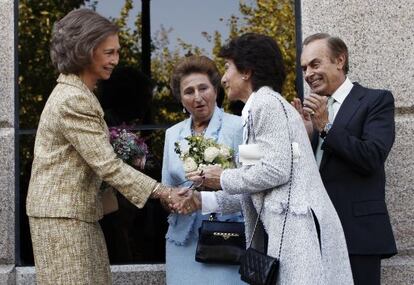Sour notes over public music school
Madrid withdraws funding from institute as war of words over director's role grows

Just hours after a top Madrid official accused the head of the city's Chamber Music Institute of using public money to finance her philanthropic work, the local government distanced itself from his controversial statements.
Fernando Villalonga, who was the capital's culture chief until April and now presides over three municipal corporations, expressed serious doubts over Paloma O'Shea's management of the music school, first verbally in the city council and later in writing.Villalonga alleged that the city was "forced" to slash its contribution to the school because of the president's "bad practices" and "lack of transparency, judgment and morality." He ironically suggested that O'Shea wanted to go on "obtaining funds from all citizens to carry out her admirable, meritorious philanthropy."
He also told the opposition Socialist, United Left and UPyD groups that if they ever "took a look at the accounts" they "would be shocked."
His words have earned Villalonga added criticism for their sexist tone: he referred to O'Shea as "the wife of Don Emilio Botín," the executive chairman of the Santander banking group, rather than using her own name or professional titles."Are you defending the fact that the wife of Don Emilio Botín is doing philanthropy with public money? Do you think that Murdoch's or Rockefeller's other half would do philanthropy with public money and that it would be acceptable?" he asked the local opposition.
Are you defending the fact that the wife of Don Emilio Botín is doing philanthropy with public money?"
Municipal sources told EL PAÍS that the city cut its 28,000-euro subsidy for the Chamber Music Institute, one of Madrid's main music centers, because of budget constraints, and that "all other assessments by Villalonga are personal comments made during a heated debate, and do not have the support of the city."
Meanwhile, O'Shea replied to Villalonga in another letter, expressing her "pain" at the "mendacious attack" against her and "the openly sexist formulation" of his accusations, referring to her "in my condition as wife to my husband," which she considers "an offense typical of an old-fashioned mindset that we thought we had already moved past." O'Shea also noted that Villalonga's accusations were an insult not just to the institute but also the "three entities [the ministry, City Hall and the regional government] that make up the board." O'Shea added that the institute's books are "periodically audited by Deloitte."
The Chamber Music Institute was created in 2007 by the then-Socialist central government, the regional authority and the city of Madrid (both ruled, then as now, by the conservative Popular Party), in partnership with the Albéniz Foundation, which O'Shea presides. National and regional authorities pledged to contribute 240,000 euros a year apiece, while the city only committed to an annual 90,000 euros. But it also contributed a lot to Plaza de Ramales, next to the Teatro Real opera house, to build the school. Construction work was paid for by the foundation (22 million euros), but ownership of the building will revert to the city in 50 years.
Since then, the institute has earned numerous international accolades and become one of Spain's most prestigious graduate centers for music studies. O'Shea herself has received Unesco's Picasso Award, The Queen Sofía Spanish Institute of New York's Gold Medal, and several other high-profile prizes.
Last Thursday, United Left councilor Milagros Hernández said that "contempt for a woman" will not be tolerated and expressed her respect, "beyond ideological beliefs," for a person "who fights for culture like O'Shea."
In response to O'Shea, Villalonga wrote that he was surprised by "the poor editing and boorish tone" of the letter from the Chamber Music Institute's chief or "whoever wrote it," and that he didn't think someone with "her good taste" could have done so. A spokesman for Villalonga complained last week about "leaks," while the institute noted that the content of the exchanges "speaks for itself."







































